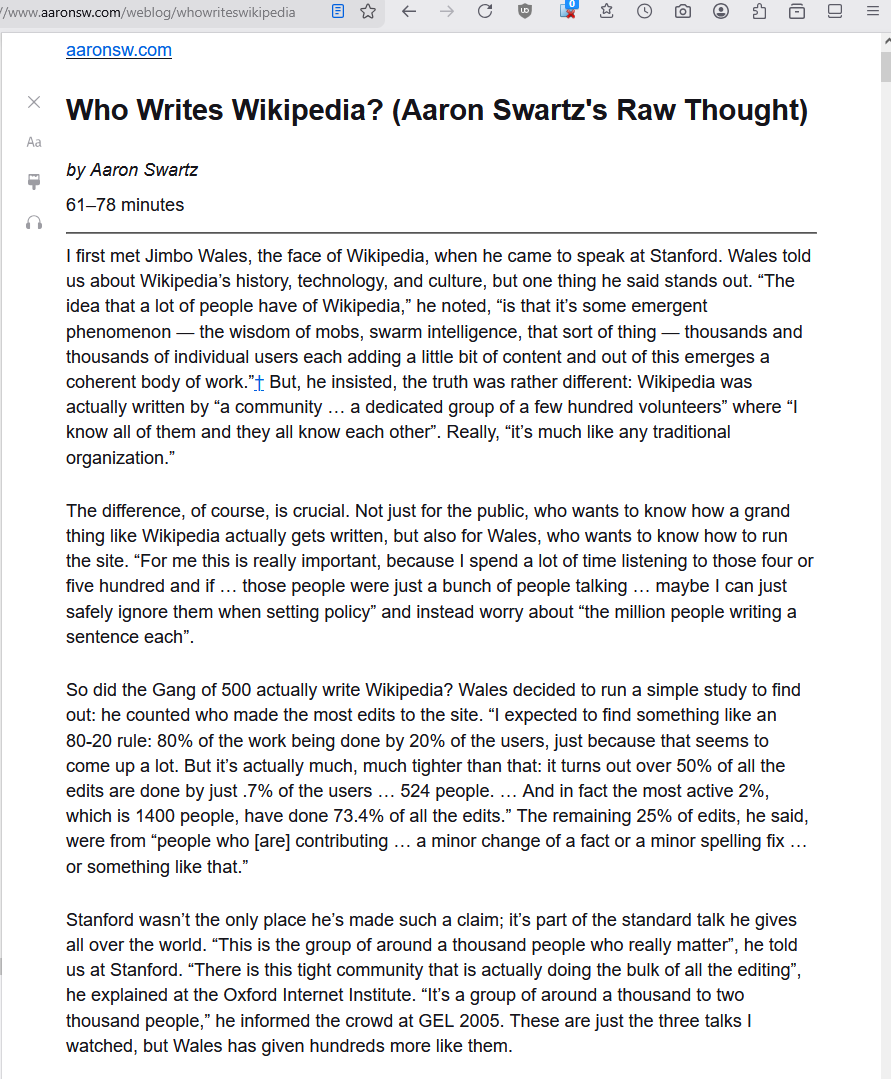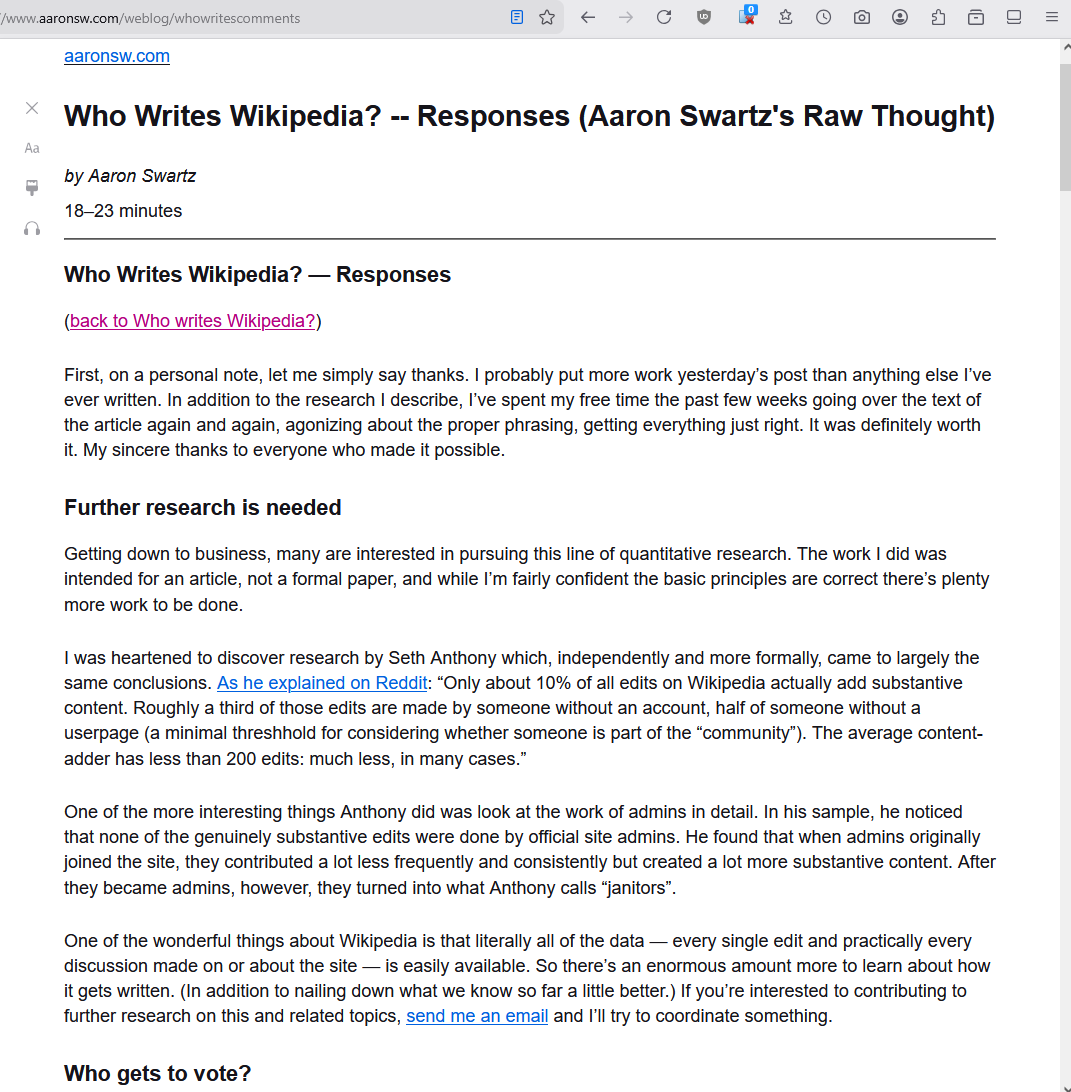Why is Wikipedia Successful (2005)
A key to the success of the engine of Wikipedia (http://en.wikipedia.org/) , is that of accumulation.
Any little tip, any little tweak, any iota of insignificance, may it be starting a article with a single sentence of worthless fact, to grammarian's obsessive tweak of a wording in a sentence, stays.
This staying power, constitute a core element of Wikipedia's success. Let me explain why.
Wikipedia started in 2001. Now, the internet and collective collaboration, especially in software, existed more than a decade before that. One telling example is newsgroup's FAQs. In as early as 1995, there are tremendous number of very well written FAQs, in topics ranging from math and sciences to the how-to's of Sadomasochism. Let's see, there are FAQs on C-programing language, on Artificial Intelligence, on Computational Geometry, on computer keyboard typing injury, on Piano, on Piano playing, on movies and actresses, on porn videos and industry, on the fine points of English writing, on anal sex, on sadomasochism dos and don'ts…etc.
These are not trivial writings, in particular content-wise. They are usually condensed summary of the subjects in question, and subjects usually you can't find in academia, with respect to the content or the writing format.
These FAQs, being Questions and Answers, are extremely practical and to the point. For instance, in SM play, they tell you where to find local clubs, what's the procedure or process of writing a contract for a sexual slave, and enlist the scientific fact of the capacity of human intestine for holding liquid for enema play, or the effects of beer enema, and so on. And, depending on the subject matter, they often have a section of references and books in case you want to know more.
These FAQs arose from early online forums, i.e. newsgroups. Thru years of online discussions, often by experts in question, some commonly asked questions and their collective answers have naturally been formed and gathered, producing these FAQs. These FAQs, number in thousands, are unprecedented collection of human literature, in a class of their own. Their like may have existed in the form of some unknown pamphlets or reference here or there on this or that subjects, but never in such quantity, quality, and ubiquitousness. Many of these FAQs, have reached a quality and usefulness that they are in fact published as books. (for example, the FAQ on C programing language) The acronym FAQ itself have become a household term and appeared shamelessly in modern English dictionaries. If there is any precedence to Wikipedia as human literature made thru internet, it is these FAQs.
With the commercialization and bloom of the internet, technologies such as mailings lists, web-based forums, instant messaging, online-journals (blogs) have progressively came into existence, with the consequence that revolutionarily expanded the efficiency and magnitude of human communication, of all possible human subjects. Then, sometimes about the year 2000, came FAQ-o-Matic, and wiki, and was born Wikipedia.
As we know, Wikipedia today is of undeniable usability, in many cases and aspects matching or surpassing those of professionally published commercial encyclopedias as well as specialized dictionaries, compendiums, annals, or the entire collection of FAQs.
If Wikipedia is such as success, we wonder, what's in it that made it so. In FAQs, we note that it is the culmination of piece-wise addition by a subject-loving collective, and that is the key: piece-wise. Great many a person in the world possess professional level knowledge of subjects. If you have written a book, you know that the process is daunting, not because you lack the subject's expertise, but the associated drudgeries and tasks around actually putting it into a organized presentation. But if you love a subject, and don't plan to write a book, in discussions your expertise flows freely, bypassing any research you might need to do, and thru collective efforts they easily form into a more well-organized presentation as FAQs, without ado about completeness, formality, or painstaking correctness but nevertheless invaluable. Still, these FAQs need someone to actually form their existence, and most of the time are the (editing) work of a single person. Even all the pieces of materials exist and are written as message posts, the task of collecting into a coherent whole with consistent style and maintain it is still dreary. This problem, of the drudgery of knowledge presentation came away with the arrival of the wiki technology. Wiki (aka Content Management Systems or web revision system), the software engine behind Wikipedia and other similar projects, is at heart a database with a interface, where anyone can use the web browser to add info or edit existing info. So, the one most pesky labor of knowledge presentation went away.
Any joe, can start or edit a piece of info. Regarded by themselves, are trite and insignificant to the point of entirely useless by all measures and judgments. However, the cumulative effect is so powerful, that it essentially breaks the wall of writing a book. And, since Wikipedia is not narrowly confined to a singe subject as in the bedrock of FAQ's forums, and Wikipedia abide a encyclopedia-style of writing instead of Questions and Answers, therefore Wikipedia becomes far wide in scope and encyclopedic in style, as we know it today.
Just read a insightful article on how Wikipedia grows. Is its content came from small percentage of Wikipedians who edit it everyday? or is it from the masses who don't even have a account? He used statistical means to find out.

- Who Writes Wikipedia? , by Aaron Swartz. @ http://www.aaronsw.com/weblog/whowriteswikipedia

- Who Writes Wikipedia? — Responses , by Aaron Swartz. @ http://www.aaronsw.com/weblog/whowritescomments
on Wikipedia
- The Encyclopedic Internet (2003)
- Why is Wikipedia Successful (2005)
- MathWorld and Wikipedia (2005)
- On Wikipedia's Misinformation (2005)
- Wikipedia Morons (2005)
- Encyclopedia, My Experiences. (2007)
- Lispers and Wikipedia (2007)
- Death of Encarta. (2009)
- Wikipedia ban on Editing Tibet (2008)
- Wikipedia Article on Cindy's Torment (2009)
- Censorship: Wikipedia and Photo of Human Vulva (2010)
- Wikipedia Donation Scam (2012 to 2025)
- Links to Wikipedia from Xah Sites (2016)
- What Things You Cannot Trust in Wikipedia (2023)